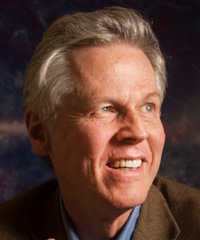
Andreas J. Albrecht |
||
Andreas is a theoretical physicist specializing in the physics of the cosmos. He is one of the inventors of cosmic inflation theory, which has become the dominant paradigm describing the early history of the universe. Modern data has allowed significant observational tests which inflation theory has passed with flying colors. Deep puzzles remain regarding the theoretical underpinnings of cosmic inflation and Albrecht is a leading figure in this research area. The discovery of cosmic acceleration (often referred to as “the dark energy”) has been transformative to the field of cosmology. Albrecht is known for his groundbreaking work in dark energy theory, including key contributions on the Dark Energy Task Force (formed jointly by US funding agencies) to determine the best strategy for studying the cosmic acceleration. Albrecht is also known for pioneering work on the arrow of time, the clock ambiguity and the origin of probabilities, topics that figure prominently in the search for a more complete theory of the cosmos. Albrecht moved from Imperial College in London to University of California Davis (UCD) in 1998 to build the cosmology program there. He served as UCD Physics Department Chair 2011-2016, and in 2017 he was named inaugural director of the Center for Quantum Mathematics and Physics (QMAP). He is a Fellow of the American Academy of Arts and Sciences, the American Association for the Advancement of Science, the American Physical Society and the Institute of Physics. Those who knew Albrecht at Cornell, might recall his enthusiasm for music, studio art and literature, in addition to physics. He is grateful to Cornell for providing such rich sources of inspiration. He continues to discover the many ways these inspirations bring joy and passion to his life as a husband, father, teacher and scientist. He is also deeply grateful for the inspiration and support provided by his friends (including some very special ones from his Cornell days), students, colleagues and especially his family. |
|
|
